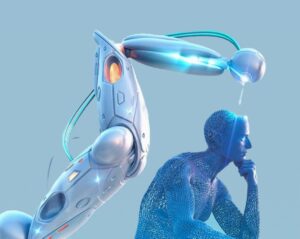Artificial intelligence (AI) has the potential to revolutionize the field of medicine by improving diagnosis, treatment, and the overall management of healthcare.
In this article, we discuss some of the ways in which AI is being used in the medical field, including the diagnosis and treatment of medical conditions, and the improvement of healthcare management through automation and streamlining processes.
We also address some of the challenges and concerns surrounding the use of AI in the medical field, such as the potential for bias in data and errors in the AI system. Overall, the use of AI in the medical field holds great promise for improving healthcare outcomes for patients.”

AI in Diagnosis and Treatment
- One of the main ways in which AI is being used in the medical field is in the diagnosis and treatment of medical conditions.
- AI algorithms can analyze large amounts of data, such as medical records, imaging studies, and lab test results, to identify patterns that may indicate the presence of a particular condition. This can be particularly useful in cases where the condition may not be immediately apparent based on a single data point, or where there is a large amount of data to analyze.
- Some examples of the use of AI in diagnosis include the development of algorithms to detect breast cancer from mammograms, predict the likelihood of a patient developing diabetes, and identify patients at risk of heart disease.
- In addition to diagnosis, AI can also be used to improve treatment decision-making. By analyzing large amounts of data, AI algorithms can provide recommendations for the most effective treatment options for a particular patient based on their medical history and other relevant factors. AI can also be used to optimize drug dosing and to identify potential drug interactions.
AI in Healthcare Management
- In addition to its use in diagnosis and treatment, AI has the potential to improve the overall management of healthcare by automating tasks and streamlining processes.
- For example, AI can be used to assist with appointment scheduling, by analyzing patient schedules and identifying conflicts or open slots that could be filled. AI can also be used to identify patients who are overdue for screenings or vaccinations, and to send reminders to patients and providers.
- Another application of AI in healthcare management is the use of remote monitoring systems to track the health of patients remotely. By monitoring vital signs and other relevant data, AI can alert healthcare providers to potential issues before they become more serious, allowing for timely intervention.
Challenges and Concerns
- While the use of AI in the medical field holds great promise, there are also some challenges and concerns that need to be considered.
- One concern is the potential for bias in the data that is used to train AI algorithms. If the data is not representative of the population, the AI algorithm may not accurately predict outcomes for certain groups of people. It is important to ensure that the data used to train AI algorithms is diverse and representative of the population that the algorithm will be used on.
- Another concern is the potential for errors in the AI system, which could have serious consequences for patients. It is important that AI systems are carefully designed and tested to ensure their accuracy and reliability.
Conclusion
- In conclusion, AI has the potential to greatly improve the field of medicine by helping to diagnose and treat medical conditions more effectively and efficiently.
- While there are challenges to be addressed, the use of AI in the medical field holds great promise for improving healthcare outcomes for patients.
